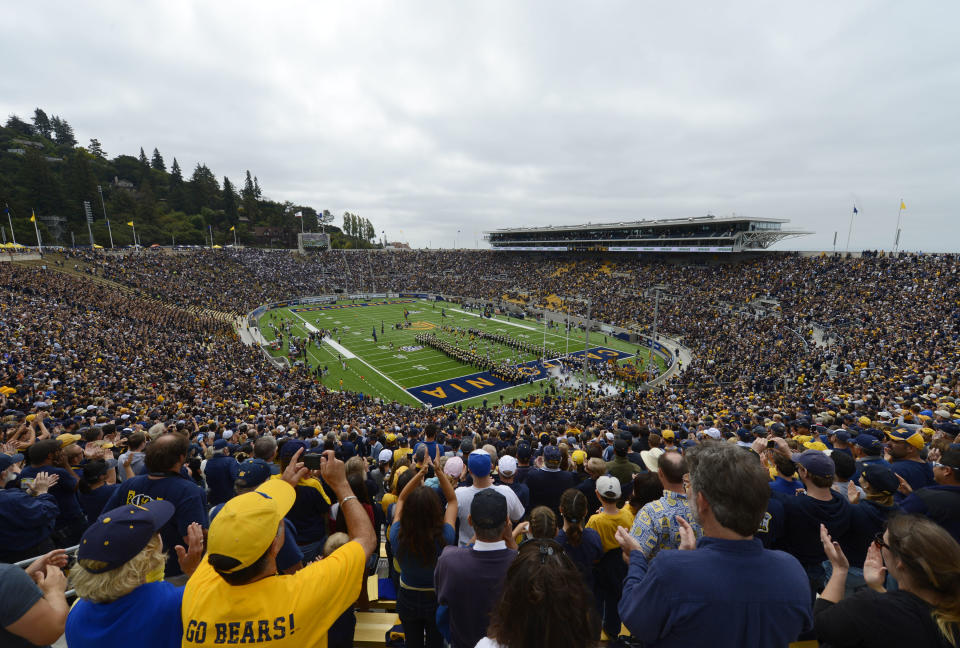Cal, Stanford monitoring potentially dangerous air quality weekend games (Updated)

Wildfires have wreaked havoc on parts of California, affecting the air quality in Berkeley. With Cal hosting Washington State at 10:30 p.m. ET on Friday night, the university is keeping a close eye on the conditions leading up to the game.
“We are continuing to closely monitor the air quality in Berkeley before Friday’s football game against Washington State, which is scheduled to kick off at 7:30 p.m., and are in communication with the Pac-12, Washington State and air quality experts as we determine the best course of action,” Cal said in a release. “We are working through a unique situation, and the health and safety of our student-athletes, fans, coaches and all those who work home football games is of utmost concern.”
The NCAA has recommended standards in place for air quality. Using the National Weather Service’s Air Quality Forecast System, specifically Air Quality Index (AQI), the NCAA suggests schools “should consider modifying or canceling outdoor athletic events” in certain conditions with special attention paid to student-athletes with “pre-existing pulmonary or cardiac conditions.”
But it looks like the air quality in Berkeley — the AQI in Berkeley on Wednesday was 187 per The Mercury News — could affect all participants. As of 10 a.m. Thursday, the AQI for the Berkeley area was 155, Cal said.
“Specifically, schools should consider removing sensitive athletes from outdoor practice or competition venues at an AQI over 100,” the NCAA’s website says. “At AQIs of over 150, all athletes should be closely monitored. All athletes should be removed from outdoor practice or competition venues at AQIs of 200 or above.”
Athletes are at “special risk for inhaling pollutants,” per the NCAA:
There are three reasons why otherwise healthy athletes, are at special risk for inhaling pollutants. First, as physical activity increases minute ventilation, the number of pollutants that are inhaled relative to when the athlete is at rest are increased. Second, during activity, a larger proportion of air is inhaled through the mouth, which bypasses the body’s built-in nasal filtration system. Third, pollutants are inhaled more deeply and may diffuse into the bloodstream more quickly during physical activity. These concerns are exasperated in those athletes with pre-existing pulmonary or cardiac conditions.
Cal did practice on Wednesday, as it has all week, though Wednesday’s session was more of a walkthrough. Overall, Wilcox said the conditions have not affected practice throughout the week but the school will continue to monitor the air quality “constantly.”
A Cal spokesperson told The Mercury News the school has communicated with the Pac-12 about the situation. Yahoo Sports has reached out to the school for comment.
Pac-12 Commissioner Larry Scott said at the conference’s men’s basketball media day Thursday that he has been in touch with both Cal and Stanford. Stanford, about an hour south of Berkeley, hosts Utah, but has an extra day for the AQI to improve with an 8 p.m. local kickoff on Saturday night.
“We have been and are, as we speak, in active discussions with Stanford and Cal administrators,” Scott said. “Sadly, we’ve been through this drill for the last few weeks with the Oregon schools and the Washington schools around football games and other games as we had fire issues and smoke issues up in the Pacific Northwest. So throughout the week we’ve been in touch.
“The thing I’d say that we’ve learned is these are day-by-day situations given the way the wind is blowing and how these fires progress and the impact on smoke. One day can be vastly different. The schools are in touch with local authorities. They have policies and procedures in place. We are certainly consulting with them and looking at contingency planning if an event can’t be played. But the highest priority will be on the health and well-being of student-athletes and fans.”
Added Cal in its statement: “AQI numbers from smoke are highly dependent on wind direction and can change rapidly. While prior data doesn’t predict the future, over the past few days, the AQI has tended to decline into the evening hours and fell into the 80s (moderate level) by 7 p.m. Wednesday.”
Stanford released the following statement Thursday:
“Smoke from the tragic North Bay fires has compromised the air quality throughout much of the Bay Area, including the area surrounding Stanford University. With several home events scheduled for this weekend, in addition to Reunion Homecoming activities taking place throughout campus, Stanford Athletics will continue to monitor the Air Quality Index (AQI), as outlined in our athletic training and NCAA policies.
“If the AQI indicates outdoor physical exertion is dangerous, we will take the appropriate steps to protect our student-athletes and fans, including postponing, rescheduling, relocating or cancelling practices and competitions, if necessary. At this time, all competitions this weekend are expected to be played as originally scheduled. Local air quality is projected to fluctuate based on meteorological conditions. The current forecast suggests improved air quality over the next two days, but the situation is changeable.”
At Cal, Wilcox said there are a few members of his team that have been “deeply affected” by the fires.
“Obviously our thoughts are with everybody up there and what’s going on,” Wilcox said. “It’s really sad and we’re here to support them, the guys on our team but also the people up there that are affected by this. This is really, really difficult for a lot of folks.”
– – – – – – –
Sam Cooper is a writer for the Yahoo Sports blogs. Have a tip? Email him or follow him on Twitter!


